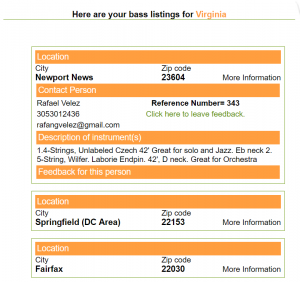The short answer is yes, but there are certain airlines that treat basses better than others.
Traveling with a bass is always a stressful situation. Even if the airline lets the bass on board, there is no guarantee the bass will arrive in one piece. There are countless horror stories on the internet of basses which arrive completely smashed. In order to ease your mind, we highly recommend getting bass insurance that covers flight damage. ISB provides a great insurance plan for basses.
Over the years, airlines have come to realize that bass players still need to be able to fly with their bass and have gone from undocumented disasters (of leaving it up to the ticket counter people) to super restrictive travel, and now back to more acceptable rules and regulations of flying with a bass.
Here we have outlined some of the bass-friendly airlines as well as some tips you can use to fly safely with your bass. Feel free to share your tips for traveling with a bass in the comments!
Bass Friendly Airlines for US Domestic Flights
Southwest Airlines
Southwest Airlines is the most bass-friendliest airline around. Fares on Southwest flights usually are lower than other airlines, but they also allow two checked bags for free. You’ll still have to pay an oversize charge of about $100 for your bass. So what’s the catch? Southwest flights aren’t usually direct to major cities, so you may end up with a long travel day. You can read more about Southwest’s baggage policy here.
Jet Blue
Jet Blue is another great airline for traveling with double basses. Your first bag (under 50 lbs) is free, but unfortunately, this will rarely cover your bass and you will probably be charged an oversize fee similar to:
$40 (2nd item) + overweight ($100) + oversized ($75) = $215 (ouch!)
You may not be charged for all three components, but it’s luck of the draw based on who is behind the service counter. Jet Blue isn’t the only airline that sometimes tacks on these fees. Make sure you check the baggage policy of the airline you choose before you fly. You can read Jet Blue’s baggage policy here.
Bass Friendly Airlines for International Flights
Traveling internationally is a much trickier process than traveling domestically. There are usually tighter restrictions on baggage sizes which can sometimes be downright terrible and inflexible. Our recommendation is to ship your bass if you can.
In general, it is the dimensions of the double bass and case that prevent you from being able to check the bass on an international flight. Most airlines limit the maximum dimensions to between 62 – 80 in/157 – 203 cm linear dimension (length, plus width and height) and maximum weight to 70 lbs for international flights.
- In the US, we’re covered because H.R.658 allows for musical instruments as checked baggage if the linear dimensions of the trunk (length, width and height) do not exceed 150 inches and the weight does not exceed 165 pounds. Click here to download a copy of the national instrument policy.
- H.R.658 does not apply to flights outside the U.S., but there is a movement led by the International Federation of Musicians for adoption of a uniform worldwide policy for air travel with musical instruments.
Depending on who checks you in, this may not be an issue. Make sure you check the policies of all connecting flights as well. If you’re flying Southwest or Jet Blue, you should be fine, but if you change airlines to one of the major players, you may be at risk of violating their checked luggage policy.
Below is an excellent overview of major airline baggage policies thanks to ISBConnect:
| Airline | Overweight Charge | Weight Range | First Class | Oversize Charge | Linear Dimensions | Special Notes |
| American Airlines | $60-100 | 50-70 lbs / 23-32 kg | $150-200 | 63-126 in/158-320 cm | *over 70lbs not allowed in many places *special baggage policy for double basses |
|
| $200-450 | 71-100 lbs / 33-45 kg | |||||
| Delta | $75-90 | 51-70 lbs / 23-32 kg | $175 | 63-80 in / 161-203 cm | *over 70lbs not allowed in many places | |
| $175-200 | 71-100 lbs / 33-45 kg | 115 in/292 cm | ||||
| United | $100-200 | 50-70 lbs / 23-32 kg | $100-200 | 62-115 in / 158-292 cm | ||
| up to $400 | 70-99.9 lbs / 32-45 kg |
American Airlines
American Airlines has the strictest baggage policy for basses. They used to require you to buy a first-class ticket, but that has recently changed.
The maximum size for checked baggage, including instruments, is 150 inches (381 cm), and the maximum weight is 165 lbs. (75 kg). Anything larger or heavier would need to be shipped via Cargo.
Delta has become a much friendlier airline for carrying double basses and instruments in general. Their new baggage policy states:
Musical instruments or equipment can be checked if the total linear dimension (length + width + height) does not exceed 150 inches (381 cm), and provided the weight, including the case, does not exceed 165lbs (75 kg).
United is one of the friendliest airlines for traveling with a double bass and their new baggage policies enable you to calculate your estimated oversized baggage cost here.
Rent-a-Bass
If you’re concerned that traveling with your bass will lead to unnecessary headaches and possible damages, you can also rent-a-bass. This service connects bass owners with people who need to rent a bass on the road.
Bass owners list their contact info and details about their bass so that you can get in touch with them if you’re traveling to their location. They even have international members from around the world so you can find a bass while traveling abroad.

Other Considerations
- Most airlines, even if they are friendly towards basses, require that the combined weight of your bass and case be less than 100 lbs. There are a few ways you can reduce the weight if you’re close:
- Take off the endpin and put it in your suitcase (endpins can weigh as much as 2-3 lbs)
- Hand carry the bow and bow case
- If you need to have a cover at your destination (as most people do), pack your cover in a cheap duffle bag separately
- We highly recommend buying a hard case for your bass. There are some cases which are intended for airline travel. Read the descriptions carefully to make sure your bass case is sturdy enough to be checked on flights.
- In case your bass does get damaged by the airline, we recommend buying bass insurance. ISB offers insurance for basses that covers damages up to $30,000 and includes damages during flight.
- Leave your case unlocked. The TSA will need to inspect your bass and if your case is locked, it will not be loaded onto the plane. You’ll be in for a big surprise when you get to your destination!
- Be courteous to the check-in staff. They don’t deal with checking basses on a daily basis (see what I did there). Rude people tend to pay more for their checked baggage. Plitely tell them that you travel with your bass all-the-time and that you are a professional musician.
We hope this article helped you prepare for your next flight with your double bass. Navigating the complex baggage policy pages of all of these airlines is complex, but with some initial research and a bit of luck at the check-in counter, you should be able to travel with your beloved bass!
Table of Contents




Always glad to see details on this topic, but the rules change so frequently that everyone should triple check matters before buying tickets and making plans. In early 2019 I underwent a horrific situation with a major U.S. airline for an international flight beginning with a domestic leg. In short, I called two months before and asked to be escalated to a manager to triple check permission to put my 7/8 bass in the cargo hull (as usual) for a potentially smaller aircraft. I even made sure they checked on the aircraft. Come day of flight, wife, luggage and even two cats in tow, the airport staff refused the double bass. They placed me on a competitor’s flight for the next day, and despite airport staff’s confirmation of OK, the following day (day of the flight), the new airport crew refused it. I ended up driving renting a mini van and driving 4 hours to major airport and flying with the original airline. After a 7 page letter, the airline made full compensation. The staff of the 2nd airline gave me completely false info (e.g. staff at CDG cannot handle large objects. I should have videoed the cheerful CDG airport worker bringing out my bass at arrival).
Thank you for providing your experience.